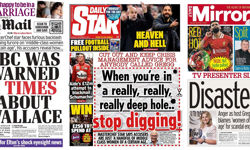When culture secretaries turn up to speak at the annual Society of Editors conference, they know what is required.
Amid promises of never-ending devotion to press freedom in a democratic society, a small bone is usually tossed to the news hounds – or at the very least, a hint of one.
This year, the best that current culture secretary John Whittingdale could manage was the suggestion that the time might not be right to introduce the imposition of all court costs on publishers who are not-compliant with the government’s royal charter recognition provisions.
Under current proposals, “non-compliant” publishers, which in effect means all publishers at the moment, would have to pay the costs of those suing for privacy and libel breaches even if the publishers won in court.
“I have to say that at the moment, I am not convinced the time is right for the introduction of these cost provisions,” Whittingdale told the conference.
But it was hardly a clear concession because the culture secretary added that his mind was still not made up on the issue.
On everything else to do with press regulation, Whittingdale took a hard line and appealed to the press to sign up to the royal charter – something that publishers have shown no willingness to do.
The culture secretary noted that IPSO, the self-regulatory body supported by most of the press “was not a million miles away” from being able to comply with the charter agreed following the Leveson inquiry.
If an arbitration scheme were set up as planned, that would make compliance with the royal charter easier for IPSO.
“Let me be clear. I would like to see the press bring themselves within the royal charter’s scheme of recognition,” Whittingdale insisted. If not, they would have to face the consequences - the exemplary damages that courts could impose on non-compliant publications.
It was made very clear that Whittingdale has no intention of backing down on that one.
Threat to FoI
One of the main underlying themes of the London conference was growing concern that a government committee looking into the operation of the Freedom of Information Act could recommend new restrictions, including the introduction of charges for making FoI requests.
An all-industry Hands Off The FoI campaign was launched at the conference and newspapers all over the country will be encouraged to re-run the public interest stories they have managed to obtain using the legislation over the past decade.
In a pointed contribution from the floor, information commissioner Christopher Graham said he planned to make a submission to the FoI inquiry.
“I will do the facts and you, if you want to, do the campaigning,” Graham urged.
Jason Collie, former deputy editor of the Oxford Mail now at the London Evening Standard, spoke of the limitations of the current FoI legislation. He told how after more than a year of submissions and appeals, he had been unable to find out how many times the Thames Valley Police had used the Regulation of Investigatory Powers Act (RIPA) to obtain phone record of journalists to try to identify whistle-blowers.
Whittingdale laughed off the concerns about any threat to the FoI just as he did the possible impact of the detailed inquiry into the future shape, structure and finances of the BBC.
The government was only having a look at the FoI Act in the way that “everyone thinks I am going to abolish the BBC just because I am looking at how it works after ten years.”
Nick Turner, president elect of the SoE compared the government looking at the FoI and the BBC to “the way a lion is only having a look at an antelope with a limp”.
The BBC
Later, Rona Fairhead, who chairs the BBC Trust revealed what effect Whittingdale’s earlier look at the BBC over the controversial issue of paying for the free licence fees for the over 75s would have on BBC finances.
Earlier this year, BBC director-general Lord Hall said that the final deal over the free licence fee and accompanying “mitigations” would be broadly neutral on BBC finances.
The BBC Trust chairman told the conference that the impact would amount effectively to a ten per cent cut for the BBC with a further ten per cent cut needed to pay for modernisation and new projects.
Fairhead acknowledged that there was not a huge appetite from all local newspapers for the BBC proposal to fund 100 new local papers to tackle a “democratic deficit” – a controversial concept in itself – following the closure of 300 local papers in the past decade. The proposal has been described as a BBC Trojan Horse.
The BBC Trust chairman emphasised there were difficult issues over suggestions that the BBC should take and pay for a minimum quota of local news from non-BBC sources.
This was in effect “another proposal for top-slicing the licence fee and we are opposed to further top-slicing,” she insisted.
The BBC Trust chairman revealed that research it had commissioned from KPMG suggested that the threat to local newspapers came from social media and specialist websites rather than the BBC.
Serving the public interest
There were some words of comfort for the BBC, which seems often under almost daily criticism from some sections of the press, from Alan Rusbridger, former editor-in chief of The Guardian in his opening lecture.
“The more the national press behaves like a journalistic battering ram on the subject, the more I feel a need for the BBC,” said Rusbridger.
When Fleet Street was in full cry, the former Guardian editor said he appreciated the BBC’s still, small, voice of calm.
“I wouldn’t want the BBC without Fleet Street but nor would I want Fleet Street without a strong BBC,” he added.
Rusbridger defended The Guardian’s award-winning reports on phone-hacking and the revelations that flowed from Edward Snowden and accused Fleet Street of sometimes behaving like a private club with a bunker mentality. Both over hacking and surveillance, the rest of Fleet Street had been found wanting.
Above all, Alan Rusbridger appealed to the press to try to regain some of its old confidence and spirit.
“Let’s root our journalism in a common idea and tradition of genuine public interest. Let’s be open to our readers and to the evolving technologies. Let’s harness the tectonic movements around us and not be fearful of them,” said Rusbridger.
The other abiding preoccupation at the conference was how to make newspapers pay in the face of declining print advertising revenues and the shift to lower yield digital.
Revisiting print
There was some modest good news from Sir Martin Sorrell, chief executive of WPP, one of the world’s largest, if not the largest advertising and marketing organisation which spends around $76 billion of advertising on behalf of clients every year.
Over the past year, Sir Martin has been edging towards a more positive attitude towards print because of the impact and levels of engagement it gives.
At the same time, there is a growing scepticism about the efficiency of advertising money spent with the likes of Google and Facebook.
Some of the video ads were viewed by computerised robots rather than people. Half of video ads, Sir Martin said, were viewed with the sound off while Facebook charged for a view that lasted no more than three seconds.
With more than a hint of understatement, the WPP chief executive argued that the current measurement system for digital advertising was not detailed enough.
By contrast, there had been a re-evaluation of the power of advertising with newspaper brands.
In the past, Sir Martin said, there had been the view that advertisers had been spending too much money with newspapers based on the time people spent reading them.
In the US, the data said consumers spent five per cent of their time reading newspaper content but attracted seventeen per cent of all advertising spending.
“Data in Canada, Australia, the UK, the US and elsewhere shows it is not just a question about time spent, it is also about engagement,” said Sir Martin who added that when people engage with newspapers in paper or digital form, the quality of the time spent is higher than used to be thought.
The extra value attracted to such an insight would, however, not be enough to bridge the funding gap caused by lower advertising yields in digital.
Paywalls: going up or coming down?
The WPP chief warned that it would continue to be difficult for publishers to rely on digital advertising alone.
“I personally believe that paywalls are the way to go,” said Sir Martin who explained that if digital advertising was going to be less profitable in future, publishers had to be more free-thinking and flexible about how to raise revenue.
Sir Martin might approve of the flexible approach adopted by David Dinsmore, chief operating officer of News UK and former editor of The Sun.
Asked whether the Sun paywall had been a failure, Dinsmore replied that the answer had to be about providing a blend of various things.
In that careful answer was the hint that the paywall at Sun digital was about to come down.
But where Dinsmore would certainly agree with Sir Martin Sorrell is on the impact, engagement and trust that newspapers generate compared with social media.
The News UK executive quoted YouGov research that showed that half of all adults trust newspapers to deliver political news compared with 9 per cent for social media.
Newspapers may sell significantly fewer copies than they used to but their content has never been more popular.
Far more people consume Sun stories now than ever before. By the time it has been repurposed and repackaged, Sun stories get to all corners of the UK and now the world,” said Dinsmore.
Without a paywall, the numbers can only rise.
Pictures by Nick Carter (Magstar Ltd) and Nigel Howard (Evening Standard / SoE)












